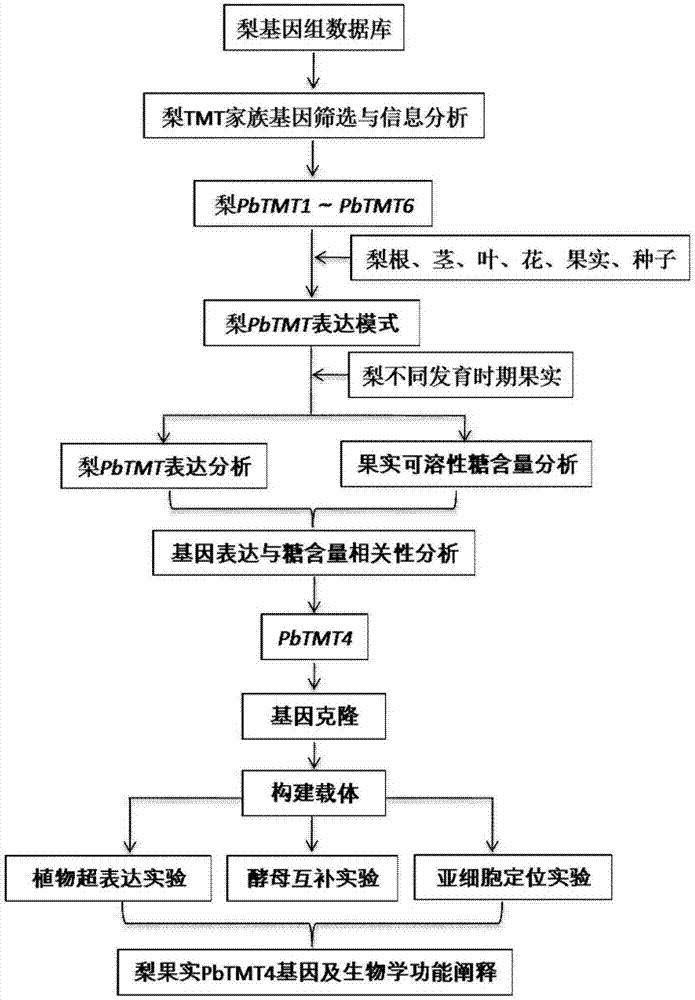Pyrus fruit sugar transporter gene PbTMT4 and application thereof
A sugar transporter, pear fruit technology, applied in the field of genetic engineering
- Summary
- Abstract
- Description
- Claims
- Application Information
AI Technical Summary
Problems solved by technology
Method used
Image
Examples
Embodiment 1
[0033] Example 1 Pear TMT family gene screening and information analysis
[0034] Using the protein sequences of Arabidopsis thaliana AtTMT1 (At1g20840), AtTMT2 (At4g35300), AtTMT3 (At3g51490) as templates in the Arabidopsis thaliana genome database and pear genome database (http: / / peargenome.njau.edu.cn / ) Blastp, to obtain homologous gene sequences. The obtained homologous sequences were clustered with the homologous sequences of each species by using the software MEGA6.0 to construct a phylogenetic tree, and those clustered with Arabidopsis TMT family genes were candidate genes. The conserved domains of all candidate genes were analyzed by the Pfam database (http: / / pfam.xfam.org / ), and sequences inconsistent with the conserved domains of TMT family genes were removed, and the conserved domains of the NCBI conservative structure database CCD (http: / / www. ncbi.nlm.nih.gov / Structure / cdd / wrpsb.cgi) to further verify the conserved domains, and finally obtain and name six pear TM...
Embodiment 2
[0037] Example 2 Analysis of PbTMT gene expression pattern in pear
[0038] Taking 'Yali' as the test material, roots, stems, young leaves, mature leaves, flowers, young fruits (30 days after full flowering), mature fruits (150 days after full flowering) and seeds were collected as samples, total RNA was extracted and reverse transcribed, The resulting first-strand cDNA was used to amplify the PbTMT gene.
[0039] Total RNA was extracted by CTAB method (CTAB extraction buffer included 2% CTAB, 2% PVP K-30, 0.05% spermidine, 10mM Tris HCl (pH=8.0), 25mM EDTA, 2M NaCl), and 1 μg RNA sample was taken, Incubate with 1U DNase I (purchased from Fermentas) at 37°C for 30min, immediately place on ice for 5min, add 1 μL EDTA (25mM) and incubate at 65°C for 30min. For first-strand cDNA synthesis One-Step RT-PCR SuperMix Reverse Transcription Kit (purchased from Beijing Quanshijin Biotechnology Co., Ltd.), operated according to the instructions of the kit.
[0040] Using pear Tubulin...
Embodiment 3
[0051] Example 3 PbTMT gene expression in pears and its relationship with fruit sugar accumulation
[0052] 1. qRT-PCR analysis of pear PbTMT gene during pear fruit development
[0053] Taking 'Yali' as the test material, the fruit samples were collected from 10 days after full flowering, and samples were collected every 20 days until the fruit was ripe. The pulp samples were treated with liquid nitrogen and stored at -80°C.
[0054] The methods for extracting total RNA from pear pulp and synthesizing cDNA, as well as the primers and reaction conditions used for qRT-PCR of each gene of pear PbTMT are the same as in Example 2.
[0055] qRT-PCR analysis of the relative expression of PbTMT gene during pear fruit development, see image 3 a.
[0056] 2. Changes of soluble sugar content during pear fruit development
[0057] The extraction steps of soluble sugar are as follows: Accurately weigh 2.0 g of pulp tissue in a pre-cooled mortar, add liquid nitrogen and fully grind it i...
PUM
| Property | Measurement | Unit |
|---|---|---|
| Molecular weight | aaaaa | aaaaa |
Abstract
Description
Claims
Application Information
 Login to View More
Login to View More - Generate Ideas
- Intellectual Property
- Life Sciences
- Materials
- Tech Scout
- Unparalleled Data Quality
- Higher Quality Content
- 60% Fewer Hallucinations
Browse by: Latest US Patents, China's latest patents, Technical Efficacy Thesaurus, Application Domain, Technology Topic, Popular Technical Reports.
© 2025 PatSnap. All rights reserved.Legal|Privacy policy|Modern Slavery Act Transparency Statement|Sitemap|About US| Contact US: help@patsnap.com



